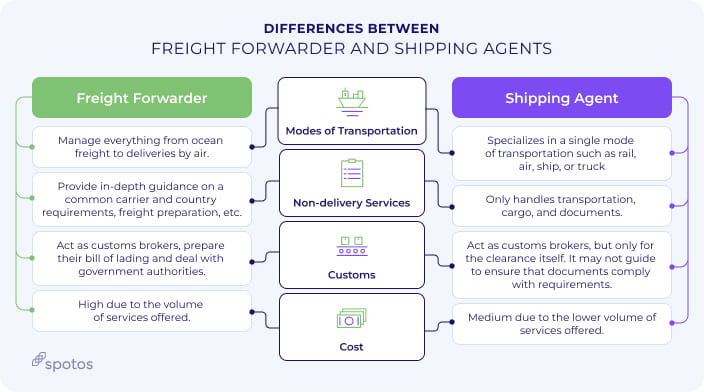Both freight forwarders and shipping agents perform fairly similar roles in the industry. They both take care of the transportation of goods, perform customs clearance, and take care of shipping lines.
Yet, these two business models aren’t identical. For example, a freight forwarder generally provides more services than shipping agents. Unfortunately, it’s quite easy to confuse the two as, on the surface, they may seem like two identical business models.
What is a freight forwarder?
Freight forwarders take care of the entire transport process, from helping with packaging to delivering goods door-to-door. Additionally, the company may aid in the distribution process and bringing the goods to market. In short, the freight forwarding process may include everything with shipping and distribution.
Some freight forwarders own carrier fleets; however, many have established networks within air, ocean, or rail companies that enable them to get great shipment rates. Since they deal with international shipping, however, many modes of transport are required. So, most freight forwarders sign multiple contracts and agreements with carriers.
Freight forwarding services include consultations before the goods are picked up. For example, perishable goods may need specific packaging and transportation so that a freight forwarder can provide their customers with the necessary knowledge.
Additionally, international freight means dealing with many countries’ customs regulations and legal intricacies. As a result, freight forwarders are well-versed in all the regulatory requirements. Hence, services provided by such companies often include creating customs documentation, paying tax and consular fees, and dealing with other freight charges.
Finally, since freight forwarder agents take physical possession of cargo, they must comply with numerous legal requirements, including insurance. Various insurance packages and government legislation protect their customers. In most cases, freight forwarding services have to be registered with the federal department responsible for logistics.
What is a shipping agent?
A shipping agent or shipping agency is an individual or company that acts on behalf of another organization. They organize the transport and handling of goods, which includes customs clearance, documentation, various declarations, etc.
Most of them will not own any trucks or fleets. Instead, they will manage cargo through carriers who will provide them with the services at better freight rates than most companies can get (with the exclusion of freight forwarders).
Unlike a freight forwarder, however, a shipping agent only manages the transportation of the process. Even with the limited scope, some may only transport freight to a specific destination instead of door-to-door.
They will also not play an educational role for the business, so a part of the responsibility during customs clearance will rest upon the customer. For example, the customer may need to take care of proper packaging, own bills of laden, and many other aspects.
Additionally, a shipping agent mostly specializes in a single mode of transportation. They may be, for example, air freight, ocean freight, or land transport companies. If an international freight shipment necessitates multiple modes of transportation, a freight forwarding agent will be required.
In the end, shipping agents manage a smaller part of the supply chain than an international freight forwarding company. As such, they are best employed by smaller companies with a less complicated supply chain.
What are the differences between a freight forwarder and a shipping agent?
Both freight forwarders and shipping agents deal with international shipments, customs clearance, and managing common carriers. The differences, however, lie in handling logistics throughout the supply chain and some of the services provided.
However, the differences between freight forwarders and shipping agents are blurry. Some agents may provide complete documentation and consultations on clearing customs. Others may own a small fleet or specialize in several modes of transportation. See the major differences between the two in the following picture.

Freight Forwarder
- Freight forwarding companies manage everything from ocean freight to deliveries by air
- Provide in-depth guidance on a common carrier and country requirements, freight preparation, etc.
- Act as customs brokers, prepare their bill of laden and deal with government authorities
- High due to the volume of services offered
Shipping Agents
- Specializes in a single mode of transportation such as rail, air, ship, or truck
- Only handles transportation, cargo, and documents
- Act as customs brokers, but only for the clearance itself. It may not guide to ensure that documents comply with requirements
- Medium due to the lower volume of services offered
In general, freight forwarding companies cover a much wider range of logistics, but the associated charges will be higher. As such, they are better when transportation becomes exceedingly complicated, as freight forwarders will reduce the oversight needed by a larger margin.
When to choose a freight forwarder?
Companies with sensitive cargo or complicated transport requirements best employ forwarding agents. Then, shippers will be able to focus on the production part of their company instead of worrying about how to ship the goods to the necessary countries.
Since freight forwarders manage everything from carriers to custom clearance, they are intended to handle the entire process. So, businesses that struggle with transport or have exceedingly prohibitive logistics costs should opt for freight forwarders.
Finally, they are great for breaking into a new market. Establishing a network of carriers, managing customs and cargo space, and building up connections with authorities can take quite some time, so employing a forwarding agent becomes much more viable.
When to choose a shipping agent?
Shipping agents are best when the logistics aren’t as complicated, do not require the services of air or ocean transportation intermediaries, and when the cargo is relatively bulky and robust. They can deliver cargo from one point to another without much issue, allowing companies to focus on building revenue.
Additionally, when freight doesn’t have a lot of requirements, all the consultations from a freight forwarding agent will not be necessary. However, it should be noted that some in-house legal expertise will be required to clear customs and prepare the necessary documentation.
Finally, shipping agents are better when budgetary concerns are higher. In most cases, they will charge a little less than international freight forwarders while still delivering the shipments to the desired country.
Frequently Asked Questions
A freight forwarder and shippers are two different business models. Shippers usually provide shipments to freight forwarders who deliver the goods to a specified country or destination.
International freight forwarders provide a much wider array of services than simply shipping. They provide consultations on customs and export requirements, tips on packaging cargo, and facilitate communication between shipper and carrier.
A freight forwarding company manages the entire export and import process, which includes clearing customs. A clearing company only manages customs and everything related to them, such as providing the necessary documentation for export.
